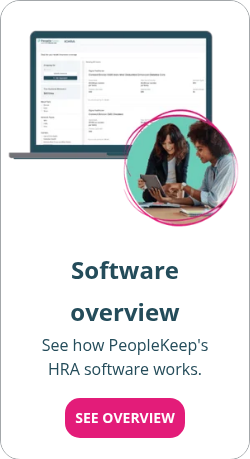How the ICHRA is changing healthcare
By Elizabeth Walker on January 8, 2025 at 1:46 PM
Group health insurance has been the traditional option for employers seeking to offer health benefits. But these days, employers are searching for ways to better manage their costs and support their teams through more personalized health benefits.
This is why an increasing number of employers are turning to the individual coverage health reimbursement arrangement (ICHRA). This health benefit is an alternative to group plans. It allows employers to offer their staff more control over their healthcare choices. But, the addition of the ICHRA to the healthcare industry has changed how people interact with the individual market, insurers, and medical care.
If your organization is considering an ICHRA, it’s vital to understand its growing impact on U.S. healthcare.
In this blog post, you’ll learn:
- How the ICHRA offers a flexible, tax-free alternative to traditional group health plans.
- The top five ways the ICHRA is reshaping the healthcare industry.
- The many benefits of the ICHRA, including how it addresses affordable healthcare challenges.
What is the ICHRA?
An ICHRA is an IRS-compliant health benefit for businesses of all sizes and industries. With it, employers can reimburse their employees tax-free for their individual health plan premiums and other qualified out-of-pocket medical care expenses.
Here's how the ICHRA typically works:
- You set a monthly allowance for your eligible employees to spend on health insurance and other medical care.
- You don’t have to pre-fund an HRA. You only pay your employees after they make an eligible and approved purchase.
- Employees buy their preferred individual health insurance plans.
- Your employees must have a qualifying form of individual health insurance to use the benefit. Uninsured employees and those without qualifying coverage can't take part in an ICHRA.
- Employees pay their health insurance premiums and other eligible expenses out-of-pocket.
- They submit proof of their eligible healthcare costs to you or your HRA administrator for reimbursement. Acceptable documentation is usually an itemized receipt or an invoice.
- When you approve the medical expense, your employees receive tax-free reimbursements up to their allowance amount. Once they reach their monthly allowance limit, they can’t exceed it.
The ICHRA can only cover W-2 employees and their eligible dependents. To continue using the benefit, employees must regularly attest that they’re still enrolled in their individual health plans.
Below are some other key features of the ICHRA:
- The ICHRA is an alternative to traditional group health plans. All employers with at least one W-2 employee can offer an ICHRA. This includes businesses, nonprofits, government groups, and religious organizations.
- Applicable large employers (ALEs) can use an ICHRA to meet the Affordable Care Act’s (ACA) employer mandate as long as their benefit allowance is affordable. Employees can opt in or out of the benefit based on affordability.
- Employee reimbursements are free of payroll taxes for the employer and income-tax-free for your staff.
- The ICHRA has no minimum or maximum employer contribution limits. You can offer your employees as little or as much money as your budget allows.
- Unlike traditional employer-sponsored coverage, there are no participation requirements to offer an ICHRA. You don’t need a certain number of employees enrolled in this personalized benefit.
- You can vary ICHRA allowances and eligibility requirements based on employee classes. You can also differ allowances based on age and family status. Customizing employee classes gives you greater control over your benefits budget and design.
An ICHRA is an excellent plan option for employers looking to provide employees with a flexible and quality health benefit.
How is the ICHRA changing the healthcare industry?
The rising costs of group health insurance are becoming challenging for many U.S. employers. According to a recent survey, 47% of small businesses with group coverage say a 15% premium increase would prevent them from continuing to offer the benefit1.
Due to increased health insurance costs, the ICHRA is becoming more popular than ever. Between 2023 and 2024, ICHRA adoption rose almost 30%2. By 2032, the federal government estimates millions of individuals will enroll in an ICHRA instead of a group health plan3.
But how is this sudden interest in the ICHRA changing the industry? Let’s dive into the top five ways in the sections below.
1. It is increasing competition in the individual market
Group coverage gives employers all the power over their health benefits. This is because only employers can choose, buy, and offer group plans to their staff. That means insurers focus on providing plans that a business owner would find most attractive—not the employee.
Employees must have an individual health plan to use the ICHRA benefit. As a result, insurers must address the growing need for individual health insurance coverage. Insurance carriers now must focus on the individual market and the quality of their health plans to compete with other insurers for consumers' attention.
This can lead to better health insurance options and greater provider networks for individuals shopping for coverage. More individuals buying policies on the individual market can also lead to lower premium costs. This is because insurers spread risk across all covered lives on the plan.
2. It gives employees more choices in their healthcare options
People want to work at a company with a quality employee benefits package with perks supporting their health and well-being. Traditional health plans use a one-size-fits-all model, which may not meet the diverse needs of every employee. In 2022, 57% of employees expressed frustration with their limited group health plan choices4.
According to KFF, 76% of employers only offered one group plan choice in 20245. In contrast, 96% of people who enrolled in individual health insurance had access to three or more qualified health plan issuers6.
The ICHRA empowers employees to choose a health plan that provides enough coverage for their personal and family needs. Employees have more choices when selecting the right policy based on the providers they visit and how much medical care they use. This can create a fairer healthcare system.
The ICHRA has also significantly contributed to increased healthcare consumerism. Because employees can purchase their own health plan after assessing their personal budget, they’re more active in deciding their medical costs and needs. This leads to a greater plan comparison and seeking value in their healthcare options.
3. It controls medical expenses for employers and employees
The average annual premium for group health insurance in 2024 was $8,951 for self-only coverage and $25,572 for family coverage. This is a premium increase of 6% for self-only policies and 7% for family plans. In contrast, there was only an increase of 4.5% in employee wages and inflation rose 3.2%5.
A major perk for employers offering an ICHRA is predictable costs from year to year. Employers decide the monthly amount of money they want to provide their employees, avoiding the rate hikes that come with traditional plans. This caps their total risk and helps them manage their business’s health benefit costs.
ICHRA is customizable enough to meet employees’ unique financial situations. They can choose healthcare coverage and medical services without straining their budgets.
The shift away from group health plans means that carriers focused primarily on group coverage may get left behind. But, the increase in profits likely to result from high enrollment in individual health insurance coverage isn’t far behind.
4. It results in more continuous medical care
Employees must stay with their current employer to access their group plan. Yet, a 2024 BLS Summary found that people switch jobs on average every 3.9 years7.
If they leave their job, employees with a group plan must enroll in a new medical plan and start paying toward a new deductible and annual limits mid-year. They may even need to choose new providers or continue seeing their old providers for an out-of-network cost. This break in health plan coverage, payments, and physicians can disrupt the quality of medical care.
Employers offering an ICHRA can’t pay for employees’ individual health insurance premiums if they leave their company. But, the employee’s health plan is portable. They can keep their plan and continue paying their monthly premiums on their own, ensuring they receive continuous care from the same medical providers.
5. It creates healthier communities
The Federal Reserve found that 27% of adults went without some kind of medical care in 2023 due to cost8. The ICHRA has become popular with younger individuals who weren’t focused on their health before as a way to help them afford coverage.
Even though these individuals may have been healthy, a balanced risk pool helps keep ACA health plan premiums down for everyone. It also helps stabilize the market and promote healthy communities.
According to the HRA Council, here are the ages of HRA enrollees in 20249:
- Ages 18-25: Almost 10% enrolled
- Ages 26-34: More than 25% enrolled
- Ages 35-44: Almost 25% enrolled
- Ages 45-54: 20% enrolled
- Ages 55-64: More than 15% enrolled
- Ages 65+: Fewer than 5% enrolled
It’s important to note the locations of high ICHRA adoptions, such as New York City, Atlanta, and Los Angeles. With more individuals getting access to preventive care through ICHRA-supported plans, the likelihood of untreated illnesses and preventable health complications decreases. Getting preventive health services also helps prevent overburdening the healthcare system and keeps the national medical debt low.
Conclusion
The introduction of the individual coverage HRA has improved the healthcare industry. The benefit allows employees to choose their coverage, provides greater flexibility than traditional group plans, and increases competition among insurers. Moreover, it’s affordable for all employers, regardless of budget.
If you need support administering your ICHRA benefit, PeopleKeep can help! Our HRA administrator software enables you to manage your ICHRA so you can focus on other essential aspects of running your business. If you're ready to start, chat with one of our HRA specialists.
1. Small business health insurance insights
3. Federal subsidies for medical insurance coverage for people under 65
4. The challenge of employer-sponsored health coverage
5. 2024 KFF Employer Health Benefits Survey
7. BLS Employee Tenure Summary
Check out more resources
See these related articles

Top 25 health insurance companies in the U.S.
What are the largest health insurance companies in the United States by market share? Find out in our list of the top 25 health insurance companies.

5 steps to a successful ICHRA launch
Discover 5 key steps to a successful ICHRA setup. Learn how to implement, communicate, and manage your ICHRA to offer flexible health benefits.

What is healthcare reimbursement?
Looking to reimburse your employees for their healthcare expenses? Learn everything you need to know about healthcare reimbursement.



